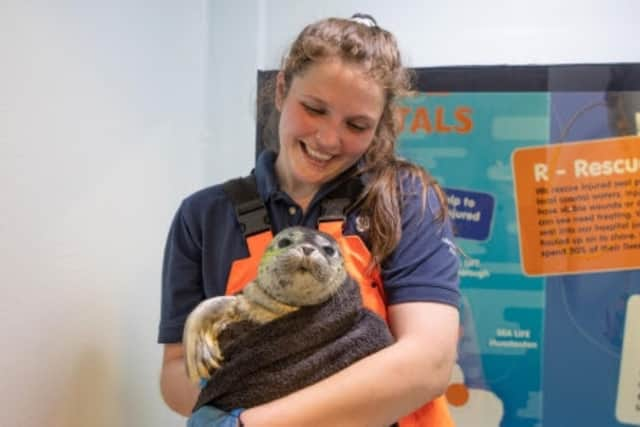Seal rescued from Scarborough beach after suspected dog attack seen thriving in wild as warning raised over animal deaths
and live on Freeview channel 276
Lady the seal was rescued by Sea Life Scarborough in April 2019, after she was found with “several wounds”, “significantly” too small for her age, very skinny and fighting an infection, which is thought to be the result of a dog attack.
Medics at the animal care team nursed her back to health before she was eventually released back into the wild in June 2019. She was recently spotted fit and healthy in the Farne Islands, near Northumberland.
Advertisement
Hide AdAdvertisement
Hide AdIn the last decade, seal rescue teams at Sea Life Scarborough and Hunstanton, in Norfolk, have rescued and rehabilitated 636 seals, which can on average each require 500 hours of care.


Nigel Croasdale, general manager at Sea Life Hunstanton, said: “We are delighted to be putting the spotlight on our animal care team and the amazing work that takes place at our seal hospital.
“Our staff work so hard to ensure seal populations can thrive and we are immensely proud of the work they do.”
Sea Life Scarborough is home to the Yorkshire Coat’s only seal hospital and sanctuary, which opened in 2008, and costs between £5,000 and £8,000 per animal rescued.
Advertisement
Hide AdAdvertisement
Hide AdIt comes as the Zoological Society of London is urging the public to report strandings of dead seals across coastlines to help scientists further understand threats facing marine mammals.
Funding provided by the Department for Environment Food and Rural Affairs has allowed the team to expand their research to provide insight into the health of the UK’s two seal species – harbour and grey seals.
Rob Deaville, project manager and researcher at Zoological Society of London’s Institute of Zoology, said: “We know that dead seals are sadly routinely found on beaches around England and Wales.
“Without coordinated research, we simply don’t yet have a strong understanding of what is causing their deaths – or even how many are dying every year.
Advertisement
Hide AdAdvertisement
Hide Ad“This presents a challenge to taking the right evidence-driven conservation action where any mortality may be due to human activities.”
Dead seal sightings can be reported to the Cetacean Stranding Investigation Programme by calling 0800 652 0333.